Secrets to a successful case-study interview
January 9, 2023

Prepping for (and maybe fretting) the case-study interview?
While this kind of interview may appear intimidating, consider this: The interviewer really wants you to do well.
So, shake off the nerves, relax and have fun.
Tips for standing out in the case-study interview:
- Take your time; don't rush it. Talk through the problem. If you can't make sense of it, take a moment and allow yourself some time to process what you've been missing. If you get stuck, get creative. Don't let yourself get bogged down; rely on your ingenuity.
- Ask questions. You can always ask your interviewer to define an acronym or to repeat or confirm details. If the interviewer asks, “How do we achieve success?”, don’t be afraid to ask, “What does ‘success’ mean to you? Is it turning a profit? Raising the company’s profile?” When you work on a client project, you need to ask questions to figure out what the problems might be, and the same applies here. The interviewer is your biggest asset in the room. They have the information you need to “solve the case” successfully. Use them wisely!
- Be flexible. The focus of a case-study interview may vary. So, be prepared to participate in whatever discussion the interviewer has in mind. They may spend the first half of the interview asking about your previous experience, or they may dive right into the case study at the start. The bottom line: Be flexible, and be ready to discuss the work you do and how you do it.
- Use visual aids. Don’t be afraid to use pen and paper, sketch out your thoughts, and talk through the problem at hand if it helps you get your ideas across. What matters most is demonstrating that you can solve problems.
- Focus on impact. Inventory the information you have, and then dive in where you can have the most impact. Don’t forget to discuss your thought process and explain your assumptions.
- Tell a story. Your experience has helped you progress in your career and education; use that experience. For example, in a business case study, you could bring your experience as a traveler to a case about a hypothetical airline. Your individuality is important. Your unique insights will serve you well when you’re interviewing.
- Pay attention to cues. If the interviewer says something, it probably means something. Don’t dismiss seemingly extraneous details. For example, the interviewer might say, “The case is about a retailer who wants to increase the value of a company it purchased, and the owner loved the brand when growing up.” The purpose of that detail is to indicate that turning around and selling the asset is not an option for making it profitable, because the owner is attached to it.
Preparing for the job you want can take time, but it’s a worthwhile investment—especially when you receive an offer.
Your ideas, ingenuity and determination make a difference.
Find your fit with Accenture.
Stay connected
Explore open roles that match your interests and skills.
Keep up to date
Get the latest stories delivered to your inbox. Select "Life at Accenture" on the registration form.
Get job alerts
Receive notifications when we have open roles and get other relevant career news.
Anaam Zamorano
RECRUITING ASSOCIATE MANAGER, HOUSTON, TEXAS
What’s the #1 Thing Blocking You From Building a 6-Figure+ Business? Take Our Quiz Now
Global Professional Association of Resume Writers and Career Coaches
How To Prepare For A Case Study Interview
Love it? Share It!
Following the recent success of our technical interview prep guide and one-way interview prep guide , I caught up with professional resume writer and interview coach Paula Christensen to learn how you can best prepare for a case study interview.
Here’s what she shared about case study interviews and how to succeed in them:
What Is A Case Study Interview?
For starters, what’s a case study interview? “A case study interview is a specific interview method in which applicants are given complex business problems to analyze and solve on the spot,” explains Christensen. “They assess a candidate’s analytical and critical thinking skills as well as personality traits such as adaptability and curiosity.”
According to her, employers use case study interviews to not only evaluate how applicants approach problems, but also the analytical frameworks they use, as well as their communication skills.
Now, how do you effectively prepare for a case study interview? Perhaps not surprisingly, preparing for a case study interview has a lot of similarities to preparing for a regular interview .
First, “To enhance any interviewing skills, especially case study interviewing skills, practice is essential,” argues Christensen. She recommends reviewing common case study interview frameworks, then practicing them with a mentor , partner, or interview coach .
Next, Christensen suggests that you “be prepared to ask clarifying questions, learn to structure your thoughts and communicate them clearly, and get in the habit of using data and facts to support your recommendations.”
You also want to be ready for follow-up questions from the interviewers. “Good follow-up questions dig beneath the surface, and by answering them well, you can demonstrate that you have done your due diligence,” adds Christensen.
Sample Case Study Interview Questions
“There are hundreds, if not thousands, of practice case interview questions available online,” says Christensen. “Be selective about the cases you choose and practice situations that closely mimic scenarios you will encounter in your job function and industry.”
With these suggestions in mind, Christensen provided the following several sample case study interview questions along with explanations on how to approach answering them.
Sample Case Study Interview Question 1
“A company is considering entering a new market; what steps would you take to evaluate the potential success of the venture?”
Christensen explains that the interviewer might ask this question with the hope of learning how you evaluate potential business opportunities, including your strategies for collecting and assessing information, as well as your process for making conclusions about the probable success of the venture.
“They also want to understand your approach to assessing the risks and rewards of entering a new market and how you make data-driven decisions,” she says. “Can you demonstrate your understanding of what it takes to evaluate a market? Can you clearly explain your reasoning and rationale for your recommendations?”
Sample Case Study Interview Question 2
“How would you approach a restructuring plan for a struggling company?”
According to Christensen, “This question is designed to test your problem-solving and reasoning skills.” With this in mind, she recommends beginning by collecting information on the company’s current situation, which could include its industry, market, finances, and any recent events that might have contributed to its struggles.
Once you’ve gathered the relevant details, you can then take steps to begin to identify the root cause of the company’s struggles, explains Christensen. Examples of the root cause might include operational inefficiency, a lack of market share, or poor financial performance.
Next, based on the root cause, you’ll want to develop an action plan that addresses the issues you identified, says Christensen. Finally, she suggests communicating how you would execute the plan. “This includes identifying KPIs to measure success and regularly monitoring and adjusting the plan as needed,” she adds.
Final Case Study Interview Tips
Learning how to prepare for and succeed in a case study interview takes time. If you can, try to avoid cramming, and give yourself ample runway to learn the nuances of case study interview questions. Also, consider heeding Christensen’s advice and find someone to support you with the process. You’ve got this!
About The Author
Dr. kyle elliott, mpa, ches, leave a comment cancel reply.
Your email address will not be published. Required fields are marked *
Save my name, email, and website in this browser for the next time I comment.
Resume Writers and Career Coaches:
What’s the #1 Thing Blocking You From Building a 6-Figure+ Business?
Take our free quiz and get your personalized Blocker-Buster Toolkit!
- Crimson Careers
- For Employers
- Harvard College
- Harvard Kenneth C. Griffin Graduate School of Arts & Sciences
- Harvard Extension School
- Premed / Pre-Health
- Families & Supporters
- Faculty & Staff
- Prospective Students
- First Generation / Low Income
- International Students
- Students of Color
- Students with Disabilities
- Undocumented Students
- Explore Interests & Make Career Decisions
- Create a Resume/CV or Cover Letter
- Expand Your Network
- Engage with Employers
- Search for a Job
- Find an Internship
- January Experiences (College)
- Find & Apply for Summer Opportunities Funding
- Prepare for an Interview
- Negotiate an Offer
- Apply to Graduate or Professional School
- Access Resources
- AI for Professional Development and Exploration
- Arts & Entertainment
- Business & Entrepreneurship
- Climate, Sustainability, Environment, Energy
- Government, Int’l Relations, Education, Law, Nonprofits
- Life Sciences & Health
- Technology & Engineering
- Still Exploring
- Talk to an Advisor
How to Succeed in a Case Study Interview
- Share This: Share How to Succeed in a Case Study Interview on Facebook Share How to Succeed in a Case Study Interview on LinkedIn Share How to Succeed in a Case Study Interview on X
Instructor: Jena Viviano
You’ve nailed the first few rounds of interviews, and now you’ve been invited to participate in a case study interview. Curious about what this next stage of the process looks like? In this course, Jena Viviano breaks it down for you, explaining the basic components of a case study interview, how to prepare, and what to do to project confidence and engage your interviewer. Learn how case study interview questions are used and why employers find them beneficial. Discover the key elements that interviewers use to evaluate your answers. Plus, learn how to formulate key questions to dig deeper into the case, develop your own framework for every case study answer, and craft a conclusion with supporting rationale that’s concise and clear. Jena also provides tips for quelling your performance anxiety, as well as sample case study questions that give you a better understanding of what to expect.
- Schedule an Appointment

- Undergraduate Students in AS&E and SMFA
- Graduate Students in AS&E and SMFA
- Faculty & Staff
- Parents and Families
- What is a Career Community?
- Reflect, Discover & Explore Multiple Interests
- Arts, Communications & Media
- Education, Nonprofit & Social Impact
- Engineering, Technology & Physical Sciences
- Finance, Consulting, Entrepreneurship & Business
- Government, International Affairs & Law
- Healthcare, Life Sciences & the Environment
- Exploring Your Interests, Careers & Majors
- Writing Resumes & Cover Letters
- Finding an Internship
- Finding Jobs & Fellowships
- Preparing for Interviews
- Applying to Graduate & Professional School
- First Generation
- International Students
- Black, Indigenous & People of Color
- Students with Disabilities
- Students with Undocumented Status
- Women & Gender
- For Employers
- Contact & Location
- Career Fellows
- Career Services by School
Case Interview: Complete Prep Guide
- Share This: Share Case Interview: Complete Prep Guide on Facebook Share Case Interview: Complete Prep Guide on LinkedIn Share Case Interview: Complete Prep Guide on X
Welcome to our preparation tips for case interviews! Whether you are just curious about case interviews or are planning to apply for consulting internships or full-time jobs, these tips and resources will help you feel more prepared and confident.

A case interview is a role playing exercise in which an employer assesses how logically and persuasively you can present a case. Rather than seeing if you get the “correct” answer, the objective is to evaluate your thought process. ( Adapted with permission from Case In Point: Complete Case Interview Preparation by Marc Cosentino).
Case interviews are very commonly used in the interview process for consulting firms and companies in similar industries. In the case interview, you will typically be given a business problem and then asked to solve it in a structured way. Learning this structure takes preparation and practice. You can learn more and practice using the resources listed below.
Why are Case Interviews Used?
Case interviews allow employers to test and evaluate the following skills:
- Analytical skills and logical ability to solve problems
- Structure and thought process
- Ability to ask for relevant data/information
- Tolerance for ambiguity and data overload
- Poise and communication skills under pressure and in front of a client
How can I prepare for Case Interviews?
1.) Read Management Consulted’s “Case Interview: Complete Prep Guide (2024)”
Management Consulted is a FREE resource for Tufts students : case and consulting resources such as 500 sample cases, Case Interview Bootcamp, Market Sizing Drills, Math Drills, case videos, consulting firm directory, and more
2.) Review additional resources:
- Case in Point – This book, by Marc Cosentino, is a comprehensive guide that walks you through the case interview process from beginning to end. This guide has helped many students over the years and can serve as an excellent foundation for how to approach business problems
- Casequestions.com – The companion website to Marc Cosentino’s book listed above offers preparation for case interviews, along with links to top 50 consulting firms
- Management Consulting Case Interviews: Cracking The Case – tips for case interviews from the other side of the table, from Argopoint, a Boston management consulting firm specializing in legal department consulting for Fortune 500 companies
- Preplounge.com – Free case preparation access for to up to 6 practice interviews with peers, selected cases, and video case solutions
- RocketBlocks – Features consulting preparation such as drills and coaching
- Practice sample online cases on consulting firm websites such as McKinsey , BCG , Bain , Deloitte and more!
3.) Schedule a mock case interview appointment with Karen Dankers or Kathy Spillane , our advisors for the Finance, Consulting, Entrepreneurship, and Business Career Community.
4.) PRACTICE PRACTICE PRACTICE cases out loud on your own (yes, that can feel odd) or preferably, with another person. See #2 and #3 above for resources and ideas to find partners to practice live cases
5.) Enjoy and have fun solving business problems!
The Ultimate Guide to the Consulting Case Interview – With Examples
This guide, written by a former McKinsey consultant and Wharton MBA, breaks down the management consulting case interview into comprehensible parts with relevant, realistic examples at every turn.

By Tracy V.
Posted March 12, 2024

Featuring Alex S.
De-Mystifying the McKinsey Interview
Wednesday, may 15.
10:00 PM UTC · 45 minutes
Table of Contents
While the consulting case study interview may seem daunting at first, most cases follow a typical song-and-dance. Once you get a hang of it, prepping feels much more manageable. The first part of this guide will give a broad overview of the case interview. The second part will break out the typical structure of an interviewee-led case. The last part will dive into each component, with tips and suggestions for preparing. Note that some firms may have their own specific case interview style. Be sure to familiarize yourself with your target firms’ interview processes before the time comes to recruit.
Case interviews involve tackling a business issue or problem faced by a company (the client). These interviews allow consulting firms to gauge candidates’ ability to perform the job. Specifically, firms are testing whether candidates can:
- Think in a structured and creative way
- Analyze and interpret new information
- Communicate persuasively and succinctly
Most firms conduct interviewee-led cases, as outlined in the guide below. In these cases, the candidate is expected to drive the case forward by asking the interviewer for data or information relevant to forming the recommendation. A few firms, most notably McKinsey, are interviewer-led, meaning that the interviewer will be the one guiding the discussion.
Below are a few common types of cases that you can expect to receive. Some cases can be several types all in one (lucky you!):
- Profitability - Determine cause for profit decline and / or ideas for increasing profit; you will rarely get a standalone profitability case – It will usually be rolled up in another case type
- Growth - consider strategies for company growth; could be through sales or market share
- Market Entry / New Business - Assess attractiveness of entering new geography / business / sector and method for entering
- Due Diligence / M&A - Assess attractiveness of purchasing / acquiring a company or business; client can be another company or a financial sponsor
- Competitive Response - Address a competitor’s recent action (e.g., new acquisition, change in pricing strategy)
- Non-Traditional - Similar to the other cases but the client (non-profit, NGO, education-focused entity) has different objectives than a typical corporate company
Case Interview Components
- Prompt: Interviewer reads aloud the case while the interviewee takes notes
- Recap: Interviewee provides a high-level summary of the case and confirms accuracy of information written
- Clarifying Questions: Interviewee asks 2-3 high-level questions
- Structuring (<2 minutes): Interviewee takes a few minutes create a roadmap for approaching the case
- Framework Presentation (2-3 minutes): Interviewee reviews the structure with the interviewer, who may have follow-up questions. Interviewee then moves the case forward by asking for additional information
- Brainstorming: Interviewee is expected to list out several solutions or ideas (e.g., cost drivers for an industry, ways to increase sales)
- Exhibits: Interviewee will be given data in forms such as graphs or charts and expected to provide high-level insights
- Math: Interviewee will be asked to perform a calculation with the new information or using data from the exhibits. Oftentimes, interviewee is not given enough information and must ask for the relevant data
- Synthesis and Recommendation (2-3 minutes) : Interviewee provides the answer first, then supporting facts from the case, and finally risks and next steps
Setup (2-3 minutes)
Prompt : The interviewer may be giving you A LOT of information - don’t write down everything verbatim. Jot down facts and figures, the client name, and the objective(s). If you miss something or don’t remember what a number means, you can ask after your recap.
- Prep: Have a friend read you several different case interview prompts and practice taking down notes. Create your own shorthand and learn how to recognize extraneous pieces of information
Recap : I always reference the client by name and start my recap with the objective(s) first, since this is the most important part of the case. The recap should be summarized, not verbatim, and you should be checking that the figures you wrote down are correct.
- Prep: Practice summarizing your notes out loud instead of repeating the case verbatim. Time yourself to make sure it’s <1 minute.
Clarifying Questions : Very detailed questions should be saved for the case. Clarifying questions are meant to help you with your structure or alleviate any confusion. Keep these at 2-3 questions. I usually ask questions pertaining to:
- Language/terminology - The interviewer won’t expect you to know the nuances of every industry or practice area. It is better you start off the case on the right footing by asking for clarifying definitions
- Goals/objectives - I always ask if there are other goals the company has in mind and, if relevant, specific financial targets or timeframe. Sometimes, the objective given is vague, so I will ask the interviewer to be more specific.
- Business model or geography - Very helpful for cases in niche industries; understanding geography can also prompt you to think about factors like labor cost or global competition
- Scope - To save you time from considering every possibility, you can ask whether the company is leaning towards one option or excluding a set of options completely
- Prep: Have a friend read you case prompts and then practice asking 2-3 clarifying questions on the fly. Try to think of them as you’re taking down notes and giving the recap. Are they helping you with your structuring or are you asking the first thing that pops into your head? Are they broad enough or overly detailed? Are there types of questions you should be asking but keep forgetting?

Framework (4-5 minutes)
Structuring (<2 minutes) : Do not use the word “framework” during the interview. I ask if I could have time to “gather my thoughts” when I am structuring. In your structure, you should have at least three but no more than five “buckets.” These are areas that you want to explore in order to solve the case. In each bucket, there should be at least three sub-bullets. Make sure there is no overlap between the buckets.
- Prep: Time yourself structuring your roadmaps. Be comfortable with recalling the different buckets you should be considering for each type of case and brainstorming sub-bullets for those buckets. It’s okay to go over two minutes when you first start, but as you get comfortable, make sure you are becoming more efficient. For example, as you become more familiar with the buckets, you don’t need to write down every example for the sub-bullets, they will become muscle memory as you recite them out loud. Review the suggested frameworks for the case and take note of whether there are vital topics you keep forgetting or whether there are unnecessary buckets you keep adding. There is no one “right” answer, but your roadmap should enable you to uncover the necessary information to make your recommendation.
Presenting: Introduce the high-level buckets first before diving into each one. You will want to “customize” your framework to the specific case you’re working on. This does not mean creating a custom framework for every single case. You can use the same topics for similar types of cases (but ensure that those topics are relevant - some cases sneakily rule out an entire topic to see if you are paying attention), but you need to make sure that you are using case-specific language and examples when you present. This shows that you are thinking about the specific problem, not just recycling a generic framework. After going through the structure, pause and ask if the interviewer has any questions. Then, give your hypothesis and state which bucket you want to start with by asking for data pertaining to that bucket and why you want it.
- Prep: Present your structures out loud and note whether you are rambling or being case-specific in your language. If you find that your presentation is too long, consider cutting down on the examples or explanations. Be succinct and say enough to get your point across. Don’t just move on to the next case if your presentation falls short. Keep practicing until you feel satisfied and make mental notes for the next case.
Interview “Questions” (10-20 minutes)
For each type of question, you are going to be doing the same things: answering the question, providing insights, conveying how it impacts your recommendation, and driving the case forward. Every time you have “answered” a question, you want to be thinking, “ What else do I need? What’s the logical path forward ?” The only way you can prepare for this is to run through entire cases! Remember, your framework is your friend. Refer back to it often if you don’t know where to go next.
Brainstorming : You will want to structure your ideas into MECE buckets. They can be fairly simple (financials vs. non-financials, external vs. internal, etc.). Similar to your framework, you will give a preview of the buckets first before going into the details of each and you will need to ensure that it is “custom” for your case. If a structure doesn’t naturally come to you, you can create a pseudo-structure by organizing how you will present your brainstorm. For example, you can state how many ideas you have from the onset or say that you will first go through the ideas first and then the associated risks.
This is a highly debated practice, but I always ask for a few seconds so I can think of a structure (they may say no). Don’t take more than 30 seconds because you can add to your buckets as you are presenting.
For non-technical brainstorms, be creative! For example, when interviewers asked about how to increase sales for a consumer-facing retail company, I would bring up TikTok campaigns and celebrity endorsements as a few ideas. Have fun with it!
Occasionally, interviewers will prod you with, “What else?” This does not always mean you didn’t give enough ideas. Sometimes it’s the opposite – they are looking to challenge you or see how you will react. Just roll with it - if you don’t have anything else, say so.
- Prep: Practice brainstorming for different types of prompts. Collect a bank of general ideas and solutions that can be customized for use across industries. Try to think of as many ideas as you can (four to six at the very least) and exercise that creative muscle. To help you with structuring, have a list of “easy” MECE buckets that you can pull out on the fly.
Exhibits : First, give an overview of the exhibit. As an example, for graphs say what the axes represent, tie it back to the case, and give your interpretation of those axes. This gives the interviewer a chance to course-correct if you misinterpreted the exhibit. Give some insight, even if it is low-hanging fruit, and tie it back to the case. There are three levels of insights for both exhibits and math:
- What the numbers say, patterns/trends (X is smaller than anticipated, Y is the largest driver)
- What the client should do (enter the market, cancel plans, plan for launch)
- What we should do next (reconsider something specific, research more data on X, move on to Y)
Oftentimes, exhibits will tie into a calculation. If you are given an exhibit with data that can be used to calculate more insightful information, tell the interviewer that you would like to make those calculations. The interviewer will lead you down that path regardless but it is more impressive if you call it out.
- Prep: Run through different types of exhibits and see how many insights from each level you can pull out. Practice anticipating what type of data you need next in order to move ahead in the case or whether you can/should calculate anything from the data given. Don’t be too insightful though – you only have a limited amount of time to run through the case.
Math : Before you start calculating anything, it is critical for you to confirm what you are solving for and that the information you wrote down is correct. SUPER IMPORTANT – answer the question that is being asked !! If the interviewer is asking for the incremental profit from a certain strategy, you don’t want to calculate the total profit from the strategy. Active listening is so important!
As you know by now, structure is everything. Again, I always ask for a few seconds to organize my thoughts (the worst thing they can say is no). Set up the problem before you start calculating. This allows you to identify whether there is data missing. Walk the interviewer through your method and ask for missing data. You may need to make your own assumptions or estimates – be sure you can justify them.
If your method is off, the interviewer will usually guide you back to the right path. This saves you from wasting time calculating the incorrect answer. Be sure to pay attention when the interviewer is trying to coach you.
As you are solving the problem, walk the interviewer through each calculation and use math shortcuts as much as possible. Again, if you make a math error, the interviewer can stop you before you go down the entire path. Save time by only calculating what is important for the case and understanding what you can skip.
- Prep: Practice setting up the problem, walking the interviewer through your proposed method, and verbalizing the calculations out loud. On paper, make sure your calculations are being done neatly and not all over the place. Look for different math shortcuts and try them out. Not all of them will fit your style, but you might find new tricks. Track whether you are answering the right questions. Once again, active listening is critical to your candidacy. Once you have correctly solved the problem, make sure you are thinking about the, “So what?” Determine how that number impacts your recommendation and where you should go next.
Synthesis and Recommendation (2-3 minutes)
Again, I always ask for a few seconds to collect your thoughts (<30 secs). If the “CEO is already in the elevator,” they may say no. Have a definitive stance – start with your recommendation and then provide two to three supporting facts using data from the case.
Address risks and next steps (i.e., what is the required analysis/gameplan – this is like real life where the firm is trying to sell additional projects). Your recommendation should be <2 minutes. Frankly, the interviewer has most likely made a decision on your candidacy. Don’t ramble and try to finish strong.
The hardest part of this is pulling out the supporting data in a succinct way. Throughout the case, you should be jotting down notes. I tend to circle what I believe to be relevant supporting data. When you present it, don’t be too specific or granular. You want your recommendation to be punchy.
- Prep: Run through whole cases where you are tracking the relevant supporting data along the way. Time your recommendation and practice verbalizing the information concisely. Don’t forget the risks and next steps. I usually have a list of generic risks (e.g., competitor response, regulation, inaccurate projections) that I can “customize” on the off-chance I’m scrambling to think of some. Your next steps can be collecting additional data to support your recommendation or ways to address those risks.
Free trial!

From 100 top coaches
Access a library of videos, templates, and examples curated by Leland’s top coaches.
Example resumes.

Example Cases

Casing Drills
Mock Interviews

Final Thoughts
- Your approach is more important than the solution – The interviewer is trying to understand how you think. Some cases have data that support recommendations in either direction. The key piece is that you are able to back your stance using the facts and data uncovered during the interview.
- Deadends are okay – There will be times when you make multiple requests for data and the interviewer does not have it. That’s perfectly fine! You can’t read the interviewer’s mind and the case could go in so many directions. Just look back at your framework to see where else you can proceed.
- Be coachable – It’s not the end of the world if your method is wrong or if you misinterpreted an exhibit. The interviewer wants to see that you are actively listening and can take feedback and improve. Don’t freak out! Stay calm! Listen to what the interviewer is trying to tell you.
This guide only scratches the surface of case interviews. The best way to prepare for case interviews is to get your reps in with entire cases. That way, you can identify your areas of weakness and be more precise with the drills. I can give you feedback and additional tips and tricks so that you are performing at your best on interview day. Book a free intro call with me on my Leland profile to discuss how we can personalize your case prep plan!
Preparing for consulting recruiting and/or case interviews? Here are some additional resources to help:
- Top 3 Tactics to Ace Your Case Interview
- A Comprehensive Guide to McKinsey & Co., Bain & Co., and Boston Consulting Group
- From No Offers to Multiple Offers - How to Take Your Casing to the Next Level
- How a Disneyland Churro Helped Me Land a Job at Bain (and 5 Pitfalls to Avoid in Market Sizing Problems)
- Five Tips to Break Into Management Consulting
Browse hundreds of expert coaches
Leland coaches have helped thousands of people achieve their goals. A dedicated mentor can make all the difference.
Browse Related Articles
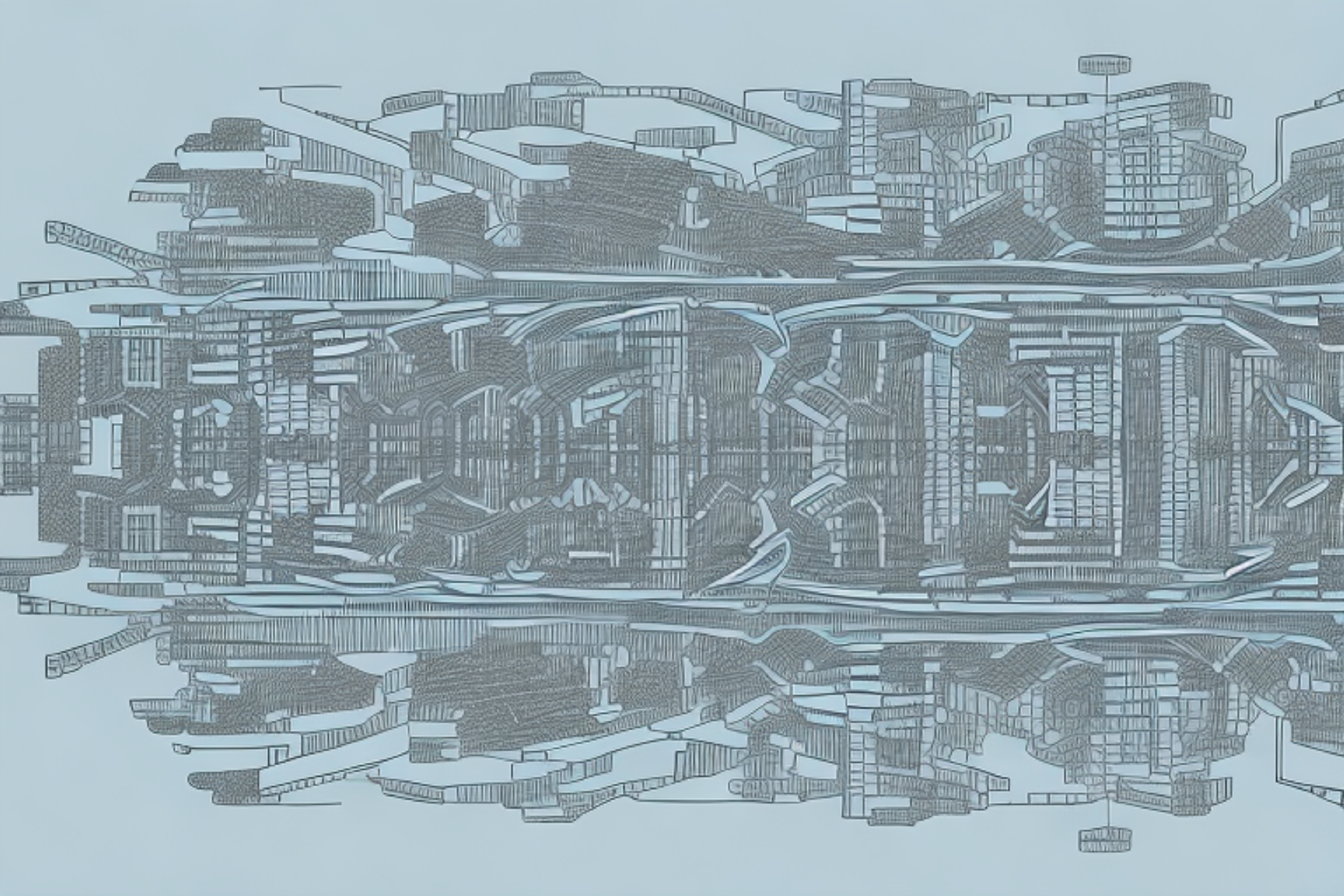
May 18, 2023
McKinsey Bonus Structure: Understanding the Reward System
Discover how the McKinsey bonus structure works and gain a deeper understanding of the reward system in this comprehensive guide.

Victor Cheng LOMS: Is It the Ultimate Guide to Case Interviews?
Discover the ultimate guide to acing case interviews with Victor Cheng's LOMS program.

June 8, 2023
A Comprehensive Guide to McKinsey Case Interview Preparation
Looking to ace your McKinsey case interview? Our comprehensive guide has got you covered! From understanding the interview process to mastering case frameworks, we provide expert tips and strategies to help you prepare and succeed.

January 2, 2024
The Ultimate Guide to the EY Parthenon Case Interview Process
Are you preparing for the EY Parthenon case interview process? Look no further than our ultimate guide, packed with insider tips and strategies to help you ace the interview and land your dream job.

May 11, 2023
How to Prepare for McKinsey Management Consulting Behavioral Interviews?
If you're preparing for a McKinsey management consulting behavioral interview, this article is a must-read.
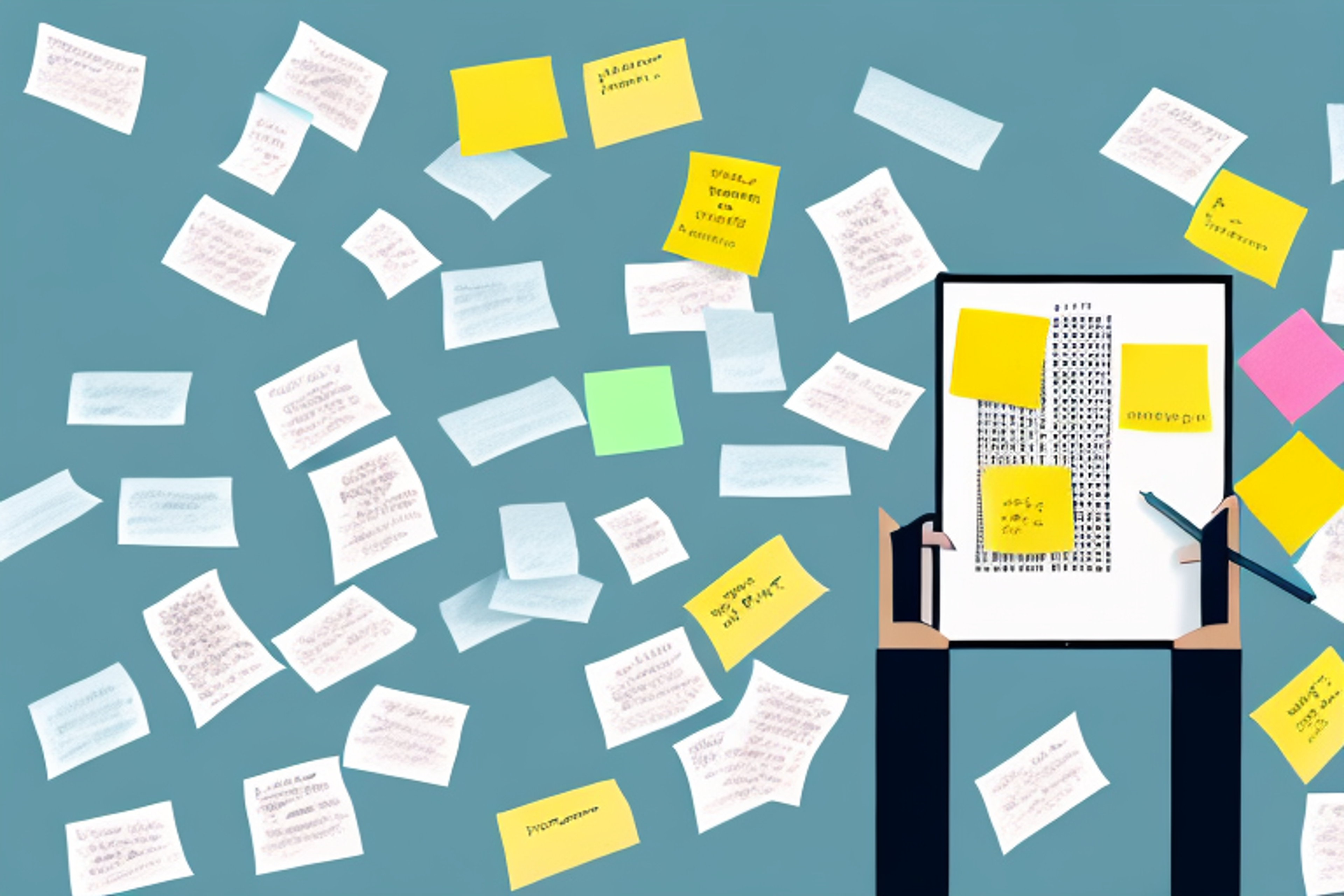
How to Prepare for McKinsey Management Consulting Networking Calls?
Learn how to ace your McKinsey management consulting networking calls with these expert tips and strategies.

McKinsey First Year Salary: What to Expect and How to Negotiate
Are you curious about what your first year salary at McKinsey might be? This article provides insights on what to expect and tips on how to negotiate your salary.

Mckinsey Consulting Salary: A Comprehensive Overview
Discover everything you need to know about McKinsey consulting salaries in this comprehensive overview.

Business Analyst McKinsey: A Comprehensive Career Guide
Discover the ins and outs of a career as a Business Analyst at McKinsey with our comprehensive guide.
IQVIA Interview Process: A Comprehensive Guide for Success
Looking to ace your IQVIA interview? Our comprehensive guide covers everything you need to know to succeed, from the application process to common interview questions and tips for impressing your interviewer.

Navigating the Shift from Energy Sector to Management Consulting: An Insider's Guide
Are you considering a career shift from the energy sector to management consulting? Look no further than our insider's guide, filled with tips and insights to help you navigate this exciting transition.

Transportation to Management Consulting: An In-depth Look at How to Make the Transition
Are you considering a career change from transportation to management consulting? Look no further! Our in-depth article provides valuable insights and practical tips on how to successfully make the transition.
Home Blog Business A Guide for Case Study Interview Presentations
A Guide for Case Study Interview Presentations
You’ve been called for an interview at your dream firm and spent the entire night rote learning policies, laws, and theories to impress the panel of interviewers with your ability to retain knowledge. However, when the interview presentation begins, contrary to your expectations of being asked to recall the information you’ve memorized, you are handed a piece of paper, which entails details about a financial embezzlement scandal. You are instructed to analyze the document and provide solutions to the problems mentioned at the end of the document.
The above-mentioned hypothetical situation is an example of a case study interview, often used by professional services firms to assess and hire applicants.
Table of Contents
What is a case study interview?
Why a case study interview, format of a case study interview, non-profitability cases, startup and early stage ventures, market sizing framework, profitability framework, market study framework, merger & acquisition cases framework.
- Example Scenario 1
Example Scenario 2
A case study interview is one in which the candidate is interviewed about a scenario-based business organizational challenge that the company may have experienced. The case interview allows candidates interested in a career in consulting to exhibit their analytical, communication, and reasoning abilities. The case study interviews are constructed in such a way that they aid in identifying key issues in order to develop effective solutions. ( LSE )
To gauge a potential employee’s ability to apply theoretical knowledge to real-world situations and develop workable answers in a constrained amount of time, interviewers use the case study interview method. Big market players, like McKinsey, Deloitte, or Bain and company, use case studies in their job interviews . The interviewer may measure a candidate’s ability not just to grasp technical elements of a real-life problem, but also to come up with creative solutions, by asking case study questions.
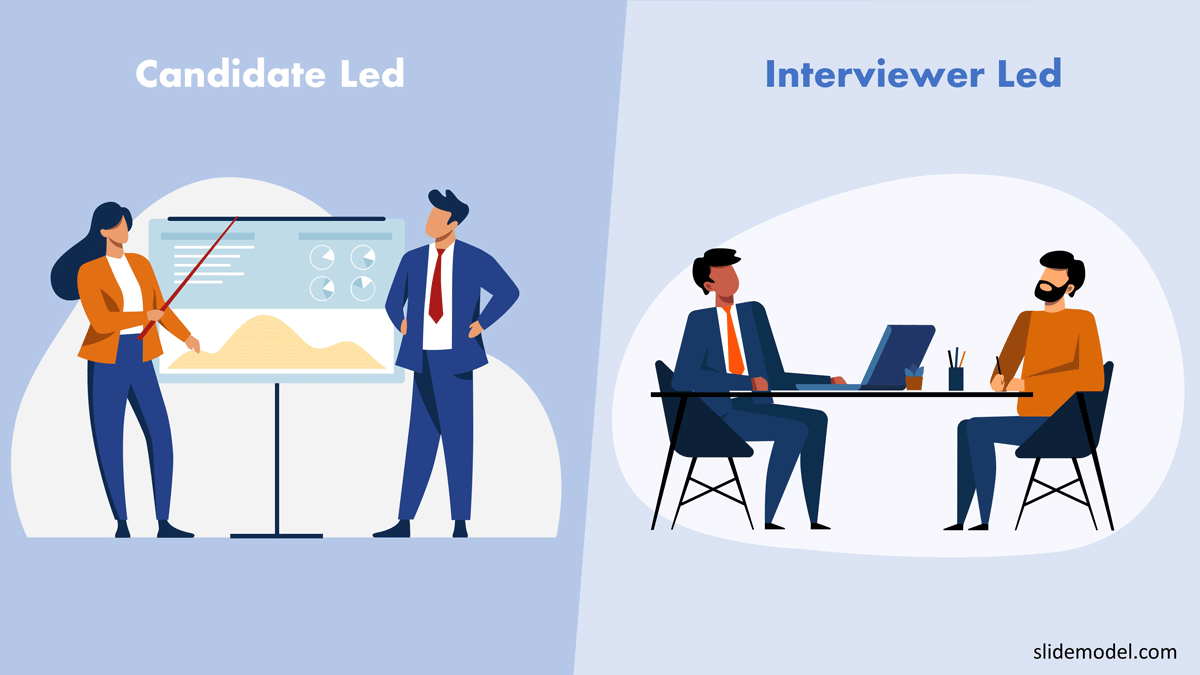
Case study interviews are often carried out in one of two ways, depending on the goals and specifications of the company conducting the interview.
- Interviewer-led interview
- Candidate led Interview
Interviewer led
During a case study interview, the interviewer is the one who sets the tone, pace, and overall structure. It is a highly structured interview where the candidate should be prepared for a sudden change of style depending on the interviewer. The interviewer continues asking questions they’ve already prepared regardless of the candidate’s answers.

Candidate led
In contrast to an interviewer-led, a candidate-led is less regimented, and the candidate takes the wheel. They are expected to shape the Interview from start to finish. In this case, the candidate’s answers determine the line of questions. It is convenient for a firm to assess if an individual can handle situations independently by conducting a candidate-led interview.
In the final section, we’ve provided candidate- and interviewer-led interview cases in our examples.
Archetypes of Case Study Interviews
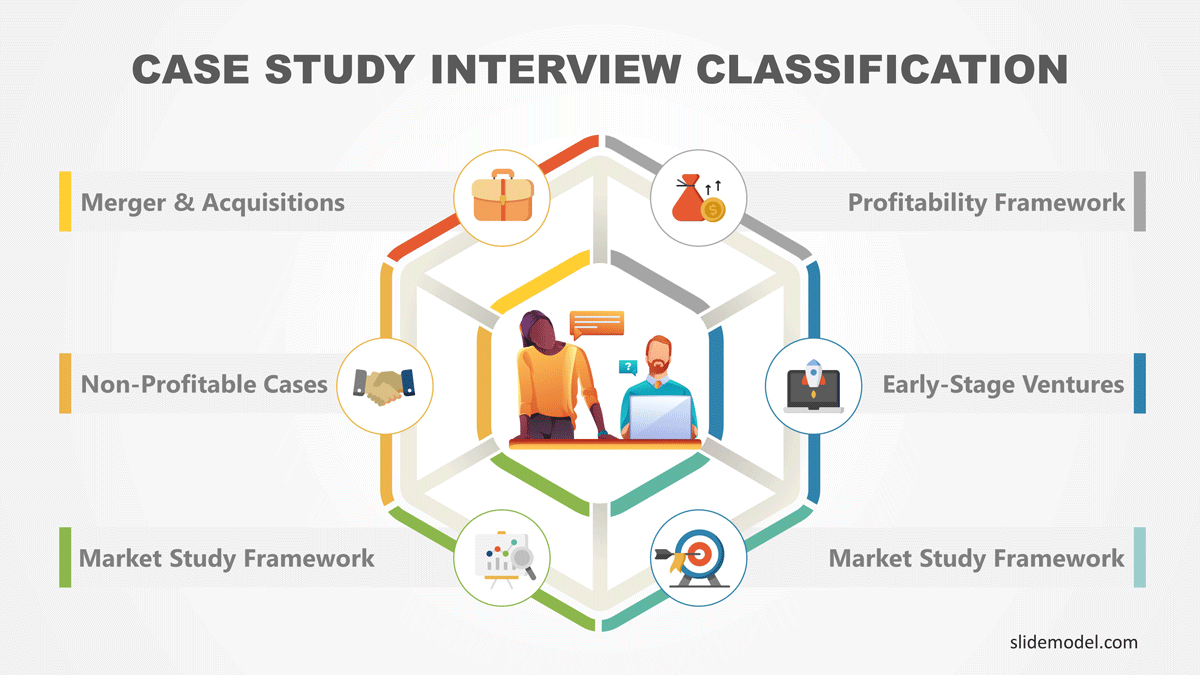
Not every case study interview is centered on profit or revenue-generating scenarios. The interviewer may begin with a case of Non-Profitability. The analyzed organization might face a challenge to reach an objective. It requires a situation analysis in order to provide a diagnosis. The candidate will run the analysis, provide a diagnosis, and based on it will define a strategy to overcome the challenge and reach the objective.
During the case interview, the focus is on strategic issues and recommendations for developing an industry’s environment while dealing with challenges. Regulations, consumer preferences, and more might all fall under this umbrella. Here, a SWOT analysis is useful in identifying the competitive landscape.
Taking into account the emerging Industrial Revolution 4.0 startup boom. The interviewer will most likely use this as an example in your case study interview. Market entry cases are comparable to startup, and early venture case studies, except the company, is smaller and employs fewer people. One must have a strong product or service in order to have a foothold in the market with significant profit margins.
The case study discussion should focus on the following three areas: the right people, the right problem, and the right solution. A minimum viable product and a well-thought-out business strategy are necessary. Startups are more likely to be agile and successful when these three characteristics are present.
In a market sizing question, commonly known as ‘guesstimate,’ the candidate is asked to estimate the size of a market randomly selected by the interviewer with little or no data available. Market size questions should be approached by segmenting data and adapting the MECE technique. In a case study interview, you may also solve market sizing problems by using the issue decision tree .
Case study interview questions can be the following:
- Estimate the market size of frozen foods in a suburban area of Melbourne.
- How many individuals are currently consuming vitamin water in China?
Every firm’s ultimate goal is to earn profits; therefore, the profitability framework seeks to identify whether the candidate can correctly assess the cause of decreased profitability or ways of increasing profitability. Candidates are usually provided with names, figures, and facts to answer questions pertaining to different aspects of profitability.
A market study framework generally aids in determining an individual’s ability to assess market factors like market entry potential, revenue growth, and market share.
In order to construct a framework for a market study in a case interview, the candidate must focus on five components. The market, rivals, customers, your firm, and your product/service are all included. This market analysis methodology necessitates the candidate to ask further clarifying questions on the financial and profitability impact on the company in discussion.
The merger and acquisition cases framework is considered one of the most accurate judges of the candidate’s potential as it deals with all major components of market analysis, including but not limited to market sizing, profitability, and market study factors. These case study interview questions usually deal with whether or not two or more companies should opt for a merger/acquisition.
When addressing an M&A case, three components should be taken into account: the synergies between the two organizations, the integration of talent, technology, and so on, and regulatory approvals.
Case Study Interview Example Scenario 1
Objective: Country X is situated in Asia and has a population of 20 million. It is developing a national action plan to transform its education system. It wants to improve the quality and quantity of children’s education. The objective is to advise the client on transforming their education system.
Description: Country X is a developing nation of 20 million residents and has emerged as a free market economy after spending decades under communism. The Country aspires to have an economic action plan for transforming education. The schooling system in Country X is completely public (state managed) and has government-run schools spread throughout the Country. Children are admitted from age 5 to 18. The objective is to evaluate the current state of the education system and how it can meet the aspirations of the Government.
This type of scenario mostly follows an interviewer-led approach. This falls under the Non-Profitability case study example. The primary purpose is to examine the issue from the top-down approach to get a higher-level view. Initially, qualitative analysis is performed.
- The interviewer will first ask how you intend to analyze and evaluate the problem’s underlying issues.
An approach is to structure the response into three sections. A PowerPoint slide with a clear bifurcation of these three sections can be presented under a separate heading.
The initial section should emphasize some quantitative metrics of education. This encompasses observations such as how age, gender, and geography affect access to education. How many teachers are working in schools around the region? How much is spent on healthcare?
The second component is the quality of education, including the curriculum, teaching methods, etc. The second question is quantitative and requires analysis of a table containing distinct informational values relative to competitor nations.
A third element of the analysis could be to understand the effect of education in Country X’s economics objectives.
You will be provided with a table with figures for the number of pupils and teachers, health care expenditure, student-to-teacher ratio, etc. You will be expected to evaluate competitor values in comparison to Country X. Among the observations that can be made are how Country X compared to other nations regarding health care spending and the student-to-teacher ratio. The table values can be interpreted as, e.g., Country X has the highest education expenditure but has the lowest student-to-pupil ratios. All this information can be presented using SlideModel PowerPoint templates .
Comparing the observation to international standards is another way of acquiring a deeper understanding of the provided data. Because only 15 percent of Country X’s population is enrolled in school, the question is how many schools should be opened given that Country Y surpasses Country X in an international comparison. To solve such a puzzle, you will use comparable data to compute the number of schools utilizing population and school information from the provided data. This will assist you in determining a solid number to present in the Interview. The final number can be presented as a percentage or an absolute number in a much larger font on the ppt slide. SlideModel has a variety of case study templates you can choose from to showcase your result in a much more engaging manner.
These two approaches for the qualitative and quantitative aspects of the case Interview enable us to cover the fundamentals of a case study interview.
Objective: Client Y is about to launch a new phone and desires to determine the size of the Apple product market. The objective is to determine how many iPhones Apple sells in the United States annually.
Description: Client X seeks an analysis of the current market size of the iPhone, its primary rival in the mobile phone industry. The current population of the United States is 320 million, and iPhone has a very large client base in the Country. The client requests that you calculate a number that provides a reliable estimate of the size of the iPhone market in the United States.
We will use a Three-step technique for a market size example to tackle this problem.
Step 1: Formulate the right question
To define market size, asking appropriate clarifying questions is a must. It is useful to define what the market size is and how to give a proper estimate for the market segment based on the given information.
For example:
Are we concentrating on a single iPhone model or the entire lineup?
Is it simply applicable to the United States, or do we also need to estimate worldwide iPhone sales through the US outlet?
After asking the appropriate clarifying questions, you can formulate a coherent strategy.
Step 2: Building a Framework
There are two sorts of problem-solving strategies for gauging the market questions. The top-down method and the bottom-up method.
The appropriate and easy way to solve this is to utilize top-down methodology and show it via an Issue tree. Using the MECE (Mutually conclusive and Collectively exhaustive) technique , an issue tree is a logical tree that may be depicted graphically to address difficult business challenges. It is quite common in market size questions. On the SlideModel website, you will discover a choice of templates for creating an excellent visual tool, i.e., The Issue/Logic tree.
You might convey it by beginning with the United States 320 million people.
Determine what proportion of phones are iPhones.
Identifying the frequency with which an individual purchases an iPhone each year.
And determine the number of iPhones sold based on the frequency and quantity of iPhone owners.
Step 3: Estimating and making assumptions
The estimated population of the United States is 320 million. Assuming that 75 percent of the United States population possesses a mobile phone and 30% are iPhone users because the number of smartphone users has multiplied in the digital era, we obtain:
75 % x 320 million = 240 million Mobile Phone users.
30 % x 240 million = 72 million iPhone users.
Again, we suppose that each of these 72 million people buys an iPhone every two years. A single client will acquire one iPhone 0.5 times in a year.
Therefore, 0.5 times 72 million is 36 million iPhone sales.
To estimate the size of the iPhone market in the United States, we might assume the average iPhone price is $100.
By calculating the cost by the number of units sold a year, we get:
$100 x 36,000,000 = $3.6 billion USD.
Therefore, the annual market size for apple goods is $3.6 billion.
Calculations and estimations utilizing the said frameworks require practice and findings. SlideModel will assist you in organizing your framework and offer you visual tools to successfully convey your findings to the interviewer.
Like this article? Please share
Business Presentations, Case Study, Presentation Skills Filed under Business
Related Articles
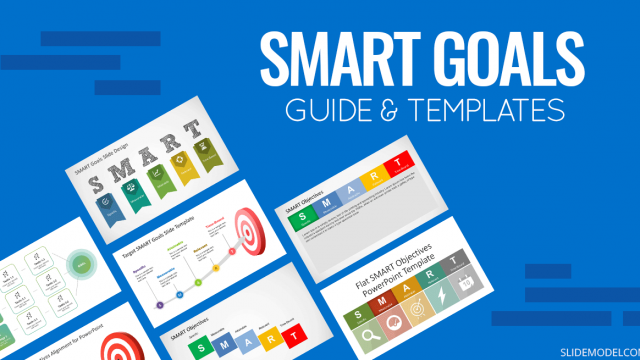
Filed under Business • April 22nd, 2024
Setting SMART Goals – A Complete Guide (with Examples + Free Templates)
This guide on SMART goals introduces the concept, explains the definition and its meaning, along the main benefits of using the criteria for a business.
Filed under PowerPoint Tutorials • April 1st, 2024
How to Add Subscript and Superscript in PowerPoint
Using subscript and superscript in PowerPoint shouldn’t be a challenge. Learn how to properly use these two special type symbols with this guide.

Filed under PowerPoint Tutorials • February 7th, 2024
How to Make a Venn Diagram in PowerPoint
Discover how easy is to make a Venn Diagram in PowerPoint with three different methods: SmartArt, PowerPoint shapes, and Venn Diagram PowerPoint Templates.
Leave a Reply
47 case interview examples (from McKinsey, BCG, Bain, etc.)

One of the best ways to prepare for case interviews at firms like McKinsey, BCG, or Bain, is by studying case interview examples.
There are a lot of free sample cases out there, but it's really hard to know where to start. So in this article, we have listed all the best free case examples available, in one place.
The below list of resources includes interactive case interview samples provided by consulting firms, video case interview demonstrations, case books, and materials developed by the team here at IGotAnOffer. Let's continue to the list.
- McKinsey examples
- BCG examples
- Bain examples
- Deloitte examples
- Other firms' examples
- Case books from consulting clubs
- Case interview preparation
Click here to practise 1-on-1 with MBB ex-interviewers
1. mckinsey case interview examples.
- Beautify case interview (McKinsey website)
- Diconsa case interview (McKinsey website)
- Electro-light case interview (McKinsey website)
- GlobaPharm case interview (McKinsey website)
- National Education case interview (McKinsey website)
- Talbot Trucks case interview (McKinsey website)
- Shops Corporation case interview (McKinsey website)
- Conservation Forever case interview (McKinsey website)
- McKinsey case interview guide (by IGotAnOffer)
- McKinsey live case interview extract (by IGotAnOffer) - See below
2. BCG case interview examples
- Foods Inc and GenCo case samples (BCG website)
- Chateau Boomerang written case interview (BCG website)
- BCG case interview guide (by IGotAnOffer)
- Written cases guide (by IGotAnOffer)
- BCG live case interview with notes (by IGotAnOffer)
- BCG mock case interview with ex-BCG associate director - Public sector case (by IGotAnOffer)
- BCG mock case interview: Revenue problem case (by IGotAnOffer) - See below
3. Bain case interview examples
- CoffeeCo practice case (Bain website)
- FashionCo practice case (Bain website)
- Associate Consultant mock interview video (Bain website)
- Consultant mock interview video (Bain website)
- Written case interview tips (Bain website)
- Bain case interview guide (by IGotAnOffer)
- Digital transformation case with ex-Bain consultant
- Bain case mock interview with ex-Bain manager (below)
4. Deloitte case interview examples
- Engagement Strategy practice case (Deloitte website)
- Recreation Unlimited practice case (Deloitte website)
- Strategic Vision practice case (Deloitte website)
- Retail Strategy practice case (Deloitte website)
- Finance Strategy practice case (Deloitte website)
- Talent Management practice case (Deloitte website)
- Enterprise Resource Management practice case (Deloitte website)
- Footloose written case (by Deloitte)
- Deloitte case interview guide (by IGotAnOffer)
5. Accenture case interview examples
- Case interview workbook (by Accenture)
- Accenture case interview guide (by IGotAnOffer)
6. OC&C case interview examples
- Leisure Club case example (by OC&C)
- Imported Spirits case example (by OC&C)
7. Oliver Wyman case interview examples
- Wumbleworld case sample (Oliver Wyman website)
- Aqualine case sample (Oliver Wyman website)
- Oliver Wyman case interview guide (by IGotAnOffer)
8. A.T. Kearney case interview examples
- Promotion planning case question (A.T. Kearney website)
- Consulting case book and examples (by A.T. Kearney)
- AT Kearney case interview guide (by IGotAnOffer)
9. Strategy& / PWC case interview examples
- Presentation overview with sample questions (by Strategy& / PWC)
- Strategy& / PWC case interview guide (by IGotAnOffer)
10. L.E.K. Consulting case interview examples
- Case interview example video walkthrough (L.E.K. website)
- Market sizing case example video walkthrough (L.E.K. website)
11. Roland Berger case interview examples
- Transit oriented development case webinar part 1 (Roland Berger website)
- Transit oriented development case webinar part 2 (Roland Berger website)
- 3D printed hip implants case webinar part 1 (Roland Berger website)
- 3D printed hip implants case webinar part 2 (Roland Berger website)
- Roland Berger case interview guide (by IGotAnOffer)
12. Capital One case interview examples
- Case interview example video walkthrough (Capital One website)
- Capital One case interview guide (by IGotAnOffer)
13. Consulting clubs case interview examples
- Berkeley case book (2006)
- Columbia case book (2006)
- Darden case book (2012)
- Darden case book (2018)
- Duke case book (2010)
- Duke case book (2014)
- ESADE case book (2011)
- Goizueta case book (2006)
- Illinois case book (2015)
- LBS case book (2006)
- MIT case book (2001)
- Notre Dame case book (2017)
- Ross case book (2010)
- Wharton case book (2010)
Practice with experts
Using case interview examples is a key part of your interview preparation, but it isn’t enough.
At some point you’ll want to practise with friends or family who can give some useful feedback. However, if you really want the best possible preparation for your case interview, you'll also want to work with ex-consultants who have experience running interviews at McKinsey, Bain, BCG, etc.
If you know anyone who fits that description, fantastic! But for most of us, it's tough to find the right connections to make this happen. And it might also be difficult to practice multiple hours with that person unless you know them really well.
Here's the good news. We've already made the connections for you. We’ve created a coaching service where you can do mock case interviews 1-on-1 with ex-interviewers from MBB firms . Start scheduling sessions today!
The IGotAnOffer team

- Starting a Business
- Growing a Business
- Small Business Guide
- Business News
- Science & Technology
- Money & Finance
- For Subscribers
- Write for Entrepreneur
- Entrepreneur Store
- United States
- Asia Pacific
- Middle East
- South Africa
Copyright © 2024 Entrepreneur Media, LLC All rights reserved. Entrepreneur® and its related marks are registered trademarks of Entrepreneur Media LLC
I've Been Offered Every Job I've Interviewed For. Here Are 5 Questions I Ask Interviewers. Career consultant Kendal Lindstrom says these five questions are the winning formula for landing the role.
By Tim Paradis • May 9, 2024
Key Takeaways
- Kendal Lindstrom started a career-change consultancy after struggling to change jobs.
- She shared her strategy for acing job interviews, which includes having five key questions ready.
- They focus on areas such as company culture, team dynamics, and the employer's long-term plans.
This article originally appeared on Business Insider .
This as-told-to essay is based on a conversation with Kendal Lindstrom, 25, who lives in Scottsdale, Arizona. She runs a career-change consulting firm named Doux and works in tech. She recently posted a TikTok about five questions she has ready for a job interview. Lindstrom says she believes asking at least some of these questions is why she's always landed a role she interviewed for. The following has been edited for brevity and clarity.
I started Doux because I never liked to be put in a box in terms of my career. Coming out of college, I thought, "I just want to be known as the girl in fashion." I was so wrong. But I didn't know how to pivot into a new industry . It took me two years of connecting, trying, and failing. I found the framework of what Doux is now by failing.
After working in fashion, I got myself into medical sales. I then switched to tech because that's where my passions lie. It took me two years to go from fashion to medical sales. But from the day I decided I wanted to be a tech consultant, it only took me three weeks to get my offer letter.
The difference was I knew how to write my résumé. I knew how to become the candidate that they needed.
My formula is to map your résumé to the career you're going to, not the career you've been in. To get to my current job, I created a résumé that was unstoppable.
Usually, I tell my clients to reach out to the hiring manager. In this case, the hiring manager got to me within minutes of me submitting my résumé. The interview process was extensive, but, like I always tell my clients, it's about follow-ups.
I followed up three times because they had great candidates. But I needed to stay in front, and I needed to be the person they chose.
I had the drive
It's funny when I look back and talk to the executives who hired me. They're like: "You had no business being in tech. You had nothing on your résumé that told us that you would do a good job in this. But the way you presented yourself, it was a no-brainer to hire you because we knew you would get it." So, it's often more how you're presenting yourself in a professional realm rather than what you're saying to answer the questions.
I had drive, and that's what they were looking for. They were looking for someone young to grow with the company. If they wanted someone young, they weren't going to get all the experience in the software that they needed. But I was eager to learn, and however many hours outside work that took, I was willing to do it. I really drove home that it doesn't stop at 5 p.m. My job stops when my job is done.
Each day after work, I spent 30 minutes reading a training book my company had given me. Then, I tried to apply the knowledge for 30 minutes. The next day, I would get time on my boss's calendar and say: "This is what I learned yesterday. Tell me how you have seen this applied in scenarios with a client."
It took me about a year to really digest everything. It was tough, but it came down to whether I was willing to ask questions when I needed help rather than having too much pride and not asking anyone.
I've done a lot of interviews for my age because I kept my options open no matter where I was in my career. I've never wanted to be stagnant. So I have done upwards of 10 or 11 interviews, and I've never been told no because my goal was to make an employer feel like I had their best interests at heart and I wanted to be part of their company, which meant I needed to sell myself as a solution. And it's more about the questions you ask than the answers you get.
I have pretty thick skin
When I worked in medical sales — or even with some of the comments on my TikTok — so much was about my image. I was like, "What does my blonde hair have to do with the knowledge that I have?" Not that it ever hurt my feelings because I have pretty thick skin. In any industry, there will be people who would want to discredit someone's abilities because of how they look. But at the end of the day, I can use my brain to where people are like, "We need to listen to you."
@kendallindstrom it's more about the questions you ask than the answers you get. people want to talk about themselves. #interviewquestions #jobinterview #resume #careerchange #womeninbusines ♬ original sound - DOUX | CAREER CHANGE MGMT
Some of the comments on my TikTok have been so far off the mark. At the time of my interviews for my current job, I didn't have a website, and my social media wasn't publicly available. So, I got the job because of the things I said and the questions I asked, and not because of my appearance.
These are my five key questions:
What's the company culture like?
The first thing I tell people to ask is about company culture. That's a big one. It's such a make-it-or-break-it for enjoying your job. I wanted my audience to know that asking about it is so important because if you're miserable in your job, you're only setting yourself up to fail.
What's the lowdown on my predecessor?
The second one is, "What did the person who held this role before me do that was appreciated but not required based on the job description?" I suggest this one because I want my audience to put themselves in the role already. It's an assumptive selling tactic. I always say go into the interview and sell yourself.
I asked that question one time — "What are you going to miss most about this person?" — and the interviewer said, "Oh, they got Starbucks all the time." And I was like, "Great, I guess we'll be getting Starbucks for the office all the time."
What do my colleagues require?
The third question was, "How can I best suit the needs of my direct counterparts?" That came from wanting to understand — in the most professional way — the team you're walking into. It helps me understand and identify how I would fit into the team.
I've seen teams before where they just don't get along. But you don't know that until you sit down on the first day. And at that point, it's already too late. You're either leaving, or you've got to deal with this until you can figure out another job.
How successful is the team?
No. 4 is what the current state of the department is in reference to the bottom line. That has to do with asking about sales, of course, but I'm also asking: "Am I walking into a failing department? Are you expecting me to turn things around? Are you expecting me to just take the blame for something that's already failing? Or are you guys seeing numbers you've never seen before and need more people?" And, if so, "What did you do to see those numbers?"
What does the company's future look like?
My fifth question is my favorite. It's, "What's the company's three-year, five-year, and 10-year plan?" I love this one because I've never walked into a job and thought, "I'm only going to be here for one year," or "I'm only doing this to collect a paycheck." I always say, "Think like the CEO." I never want to go into a job and strive to just be an associate. That's just where you start.
All you really need — or maybe have time for — is one of these questions. So many people on my TikTok said, "That is too many questions. You're so high maintenance." I was like, "Just use one of them, and they'll be blown away." Because you're starting a whole other conversation that doesn't have to do with their questions for you. These are just concepts that I hope people can take with them as they go — little nuggets — to nail these interviews.
Want to be an Entrepreneur Leadership Network contributor? Apply now to join.
Editor's Pick Red Arrow
- This Mother and Daughter Were 'Kind of Fringe Weirdos' When They Started an Uncommon Business in Their Garage. Now They're in Major Retailers — and Victoria Beckham Is a Fan.
- Lock A Leadership Shortage Is Coming. Here's What Needs to Happen to Prevent It.
- Lock The Author of 'Million Dollar Weekend' Says This Is the Only Difference Between You and the Many 'Very, Very Dumb People' Making a Lot of Money
- What the NLRB Appeal of the Expanded Joint Employer Rule Judgment Means for Your Business
- Lock 12 Books That Self-Made Millionaires Swear By
- The Sweet Side Hustle She Started in an Old CVS Made $800,000 in One Year. Now She's Repeating the Success With Her Daughter — and They've Already Exceeded 8 Figures.
Most Popular Red Arrow
Bring education into the office with this $180 deal on curiosity stream.
Access award-winning documentaries on a range of subjects that can inspire creativity and fuel research.
After Months of Scrutiny, Roark Capital Finalizes $9.6 Billion Subway Acquisition
The sale, initially announced in August 2023, was delayed by Federal Trade Commission scrutiny.
6 Game-Changing Skills, From Leaders Who Underestimated Them
These business leaders never imagined how important these skills would be.
Studies Show Women Need Each Other's Support to Reach Maximum Success — and I've Experienced This Firsthand. Here's How.
Research shows women who have a close knit group of women to lean on make more money, get access to coveted opportunities and overall experience greater success in their careers. Reflecting on these findings has prompted me to share insights into how I manage my own women's network and how we empower one another to achieve remarkable growth personally and professionally.
'Highway Robbery': Burger Chain Slammed for 'Out of Control' Prices Amid Inflation
A Five Guys receipt is going viral on social media.
These 4 Words Make It Obvious You Used AI to Write a Paper, According to New Research
Scientists are increasingly using ChatGPT and other AI bots to write studies.
Successfully copied link
- SUGGESTED TOPICS
- The Magazine
- Newsletters
- Managing Yourself
- Managing Teams
- Work-life Balance
- The Big Idea
- Data & Visuals
- Reading Lists
- Case Selections
- HBR Learning
- Topic Feeds
- Account Settings
- Email Preferences
Research: Negotiating Is Unlikely to Jeopardize Your Job Offer
- Einav Hart,
- Julia Bear,
- Zhiying (Bella) Ren

A series of seven studies found that candidates have more power than they assume.
Job seekers worry about negotiating an offer for many reasons, including the worst-case scenario that the offer will be rescinded. Across a series of seven studies, researchers found that these fears are consistently exaggerated: Candidates think they are much more likely to jeopardize a deal than managers report they are. This fear can lead candidates to avoid negotiating altogether. The authors explore two reasons driving this fear and offer research-backed advice on how anxious candidates can approach job negotiations.
Imagine that you just received a job offer for a position you are excited about. Now what? You might consider negotiating for a higher salary, job flexibility, or other benefits , but you’re apprehensive. You can’t help thinking: What if I don’t get what I ask for? Or, in the worst-case scenario, what if the hiring manager decides to withdraw the offer?
- Einav Hart is an assistant professor of management at George Mason University’s Costello College of Business, and a visiting scholar at the Wharton School. Her research interests include conflict management, negotiations, and organizational behavior.
- Julia Bear is a professor of organizational behavior at the College of Business at Stony Brook University (SUNY). Her research interests include the influence of gender on negotiation, as well as understanding gender gaps in organizations more broadly.
- Zhiying (Bella) Ren is a doctoral student at the Wharton School of the University of Pennsylvania. Her research focuses on conversational dynamics in organizations and negotiations.
Partner Center

IMAGES
VIDEO
COMMENTS
Confidence. Logical and actionable thinking process. Intuition. Clear communication. Analytic mind. Related: Job Specification vs. Job Description Explained. 3. Review questions an interviewer may ask. To be successful during a case study interview, be mindful of potential questions an interviewer may ask.
Take Notes. In addition to what you usually bring to a job interview, make sure you bring a notepad and pen or pencil to a case study interview. Taking notes will help you better understand the questions and formulate your answers. It also gives you a place to calculate numbers and figures if you need to.
Tips for standing out in the case-study interview: Take your time; don't rush it. Talk through the problem. If you can't make sense of it, take a moment and allow yourself some time to process what you've been missing. If you get stuck, get creative. Don't let yourself get bogged down; rely on your ingenuity. Ask questions.
Candidate-Led: In these case interviews, you will be presented with a question by the interviewer and then expected to lead them through to an answer step-by-step. Interviewer-Led: These types of case interviewers involve "1-2 interviewers leading a candidate through a multi-step case problem," says William Wadsworth of Exam Study Expert.
During a case study interview you have a limited amount of time to come up with a logical solution for the case study questions. The best case study interview prep is to first learn about the process of a case interview. A case study framework usually looks like this: The interviewer will brief you about a business-related scenario.
A Guide To Acing Your Next Case Interview. When applying for technology, consulting or financial roles, an employer may ask you to solve a case study in order to assess your problem-solving skills. The reason employers use case studies during an interview is to determine if you can think of solutions in real-time.
In this course, Jena Viviano breaks it down for you, explaining the basic components of a case study interview, how to prepare, and what to do to project confidence and engage your interviewer ...
1. The key to landing your consulting job. Case interviews - where you are asked to solve a business case study under scrutiny - are the core of the selection process right across McKinsey, Bain and BCG (the "MBB" firms). This interview format is also used pretty much universally across other high-end consultancies; including LEK, Kearney ...
Mary regularly blogs about topics relevant to both job seekers seeking to enhance their career trajectories and the hiring managers aspiring to build highly-engaged, results-driven teams on LinkedIn. View Profile. Learn all about what to expect in a case study interview and how to prepare for and succeed in this unconventional interview format.
First, "To enhance interviewing skills, case study interviewing skills, practice is essential," argues Christensen. She recommends reviewing common case study interview frameworks, then practicing them with a , partner, or . Next, Christensen suggests that you "be prepared to ask clarifying questions, learn to structure your thoughts and ...
Preparing effectively for case study interviews involves researching the company and industry, enhancing critical thinking and problem-solving skills, mastering communication and presentation ...
In this course, Jena Viviano breaks it down for you, explaining the basic components of a case study interview, how to prepare, and what to do to project confidence and engage your interviewer. Learn how case study interview questions are used and why employers find them beneficial. Discover the key elements that interviewers use to evaluate ...
Like every interview, the case study interview aims to check if a person is a right fit for the company. When preparing for your interview, ensure you know the relevant skills needed for the role and develop your skill set around them. Some skills that employers may check for in a case study interview include: confidence; adaptability; curiosity
Case Interview 2024 - Guide for Your Consulting Case Interview. A case interview is a type of job interview in which the candidate must analyze and solve a problematic business scenario (" case study "). It is used to simulate the situation on-the-job and to find out if the respective candidate meets the necessary analytical and ...
In the case interview, you will typically be given a business problem and then asked to solve it in a structured way. Learning this structure takes preparation and practice. You can learn more and practice using the resources listed below. Why are Case Interviews Used? Case interviews allow employers to test and evaluate the following skills:
Case interviews involve tackling a business issue or problem faced by a company (the client). These interviews allow consulting firms to gauge candidates' ability to perform the job. Specifically, firms are testing whether candidates can: Think in a structured and creative way. Analyze and interpret new information.
Published Aug 26, 2022. + Follow. Companies use case study interviews to determine potential candidates' creative and problem-solving abilities. They involve analyzing business cases, brainteasers ...
Why a case study interview? To gauge a potential employee's ability to apply theoretical knowledge to real-world situations and develop workable answers in a constrained amount of time, interviewers use the case study interview method. Big market players, like McKinsey, Deloitte, or Bain and company, use case studies in their job interviews ...
One of the best ways to prepare for case interviews at firms like McKinsey, BCG, or Bain, is by studying case interview examples.. There are a lot of free sample cases out there, but it's really hard to know where to start. So in this article, we have listed all the best free case examples available, in one place.
Key takeaways: Follow the 4 Commandments. Get a feeling and true understanding of the problem and the objective. Lay out an exhaustive, well-thought-through structure. Build an initial hypothesis and prioritize the different areas. Gather data based on your hypothesis and priorities.
In this case, the hiring manager got to me within minutes of me submitting my résumé. The interview process was extensive, but, like I always tell my clients, it's about follow-ups.
Summary. Job seekers worry about negotiating an offer for many reasons, including the worst-case scenario that the offer will be rescinded. Across a series of seven studies, researchers found that ...